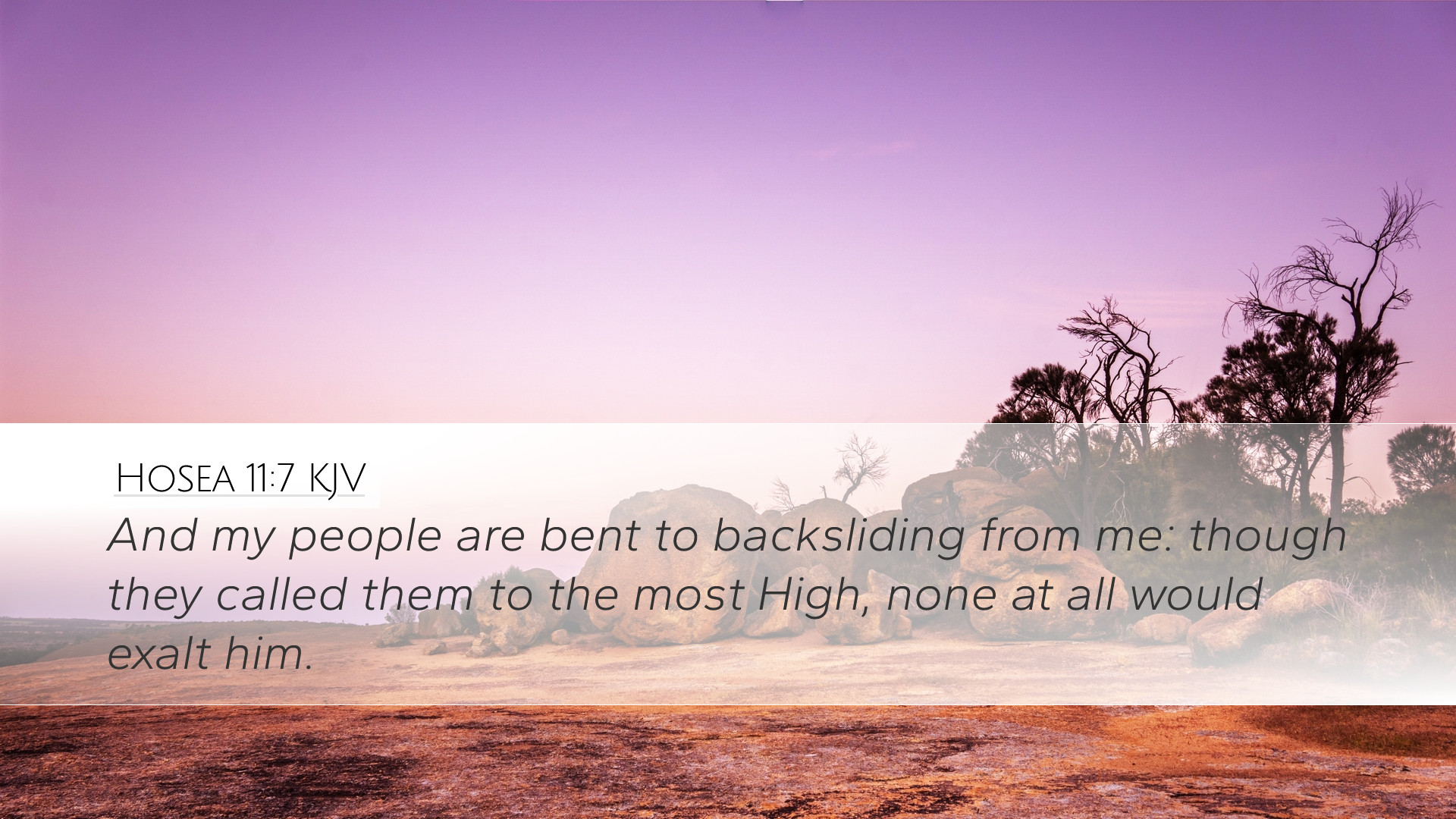Old Testament
Genesis Exodus Leviticus Numbers Deuteronomy Joshua Judges Ruth 1 Samuel 2 Samuel 1 Kings 2 Kings 1 Chronicles 2 Chronicles Ezra Nehemiah Esther Job Psalms Proverbs Ecclesiastes Song of Solomon Isaiah Jeremiah Lamentations Ezekiel Daniel Hosea Joel Amos Obadiah Jonah Micah Nahum Habakkuk Zephaniah Haggai Zechariah MalachiHosea 11:7
Hosea 11:7 KJV
And my people are bent to backsliding from me: though they called them to the most High, none at all would exalt him.
Hosea 11:7 Bible Commentary
Commentary on Hosea 11:7
Text of Hosea 11:7: "And my people are bent to backsliding from me: though they called them to the most High, none at all would exalt him."
Introduction
The book of Hosea serves as a poignant reminder of Israel's relationship with God, illustrating themes of love, judgment, and redemption. In Hosea 11:7, we encounter a profound statement from God regarding the spiritual condition of His people. The verse articulates God's lament over their inclination to backslide, despite His call to them. This commentary integrates insights from various public domain sources, providing a comprehensive examination of this verse's theological implications.
Contextual Analysis
Hosea, a prophet in the Northern Kingdom of Israel, delivered messages during a time of great moral decay and idolatry. His marriage to Gomer serves as an allegorical image of God's covenant relationship with Israel, symbolizing unfaithfulness and divine love. Matthew Henry notes that Hosea's prophecies were directed to a people engaged in unfaithfulness, reflecting the broader narrative of Israel's rebellion against the Lord.
The State of God's People
The phrase "my people are bent to backsliding from me" is central to understanding this verse. Albert Barnes interprets "bent" as an indication of a persistent, ingrained tendency away from God. The image portrays not just an occasional lapse but a full orientation of their hearts towards rebellion. This reveals a profound spiritual crisis within Israel, where the people are not simply disobedient but actively resist the call to return to their Creator.
Backsliding Defined
- Spiritual Declension: Backsliding implies a decline in spiritual fervor and commitment (as highlighted by Adam Clarke).
- Active Rebellion: The context indicates that this is not mere stagnation; there is a conscious choice to turn away from God.
The Divine Call
"Though they called them to the most High..." captures God's persistent outreach towards His people. Despite their unfaithfulness, God continues to extend His hand, seeking their restoration. Matthew Henry posits that God's yearning shows His readiness to forgive, emphasizing that the divine initiation of salvation remains unaffected by human disobedience.
The Nature of God's Call
- Persistent Grace: God's call is not easily dismissed; it emphasizes His relentless grace.
- High Calling: "Most High" signifies God's sovereignty and majesty, further stressing the weight of this call.
Human Response
The latter part of the verse, "none at all would exalt him," points to the tragic human response to God's call. Albert Barnes highlights the refusal to honor God, despite the vocal calls of prophets. The spiritual blindness of the people results in their unwillingness to glorify the One who is worthy of all praise, reflecting a broader theme in the book of Hosea concerning Israel's covenant violation.
The Consequences of Rejection
- Spiritual Barrenness: Ignoring God's call leads to desolation and spiritual death.
- Judgment: Rebellion against God brings inevitable consequences as they distance themselves from the Source of life.
Theological Implications
The themes present in Hosea 11:7 offer significant theological reflections that resonate with contemporary audiences, particularly pastors and theologians. A few key takeaways include:
- The Nature of God: This verse underscores God's relentless pursuit of His people, highlighting His character as loving and patient, yet just.
- Human Agency: The proactive choice of the people to reject God's call invites contemplation on the nature of free will and divine sovereignty.
- The Call to Repentance: The urgency remains applicable in modern contexts; believers today are also called to heed God's voice and turn from backsliding.
Conclusion
In Hosea 11:7, we find a striking encapsulation of the human condition in relation to divine grace. God's mourning over a people who repeatedly turn away from Him resonates throughout the ages; the divine call to exalt the Most High remains relevant. As Adam Clarke succinctly states, the ongoing struggle between human inclination towards backsliding and the divine longing for reconciliation is at the heart of God’s message to humanity. The cautionary tale of Israel serves as both a warning and an invitation, encouraging readers to examine their own hearts and relationships with God, assuring them of His grace and desire for their return.


